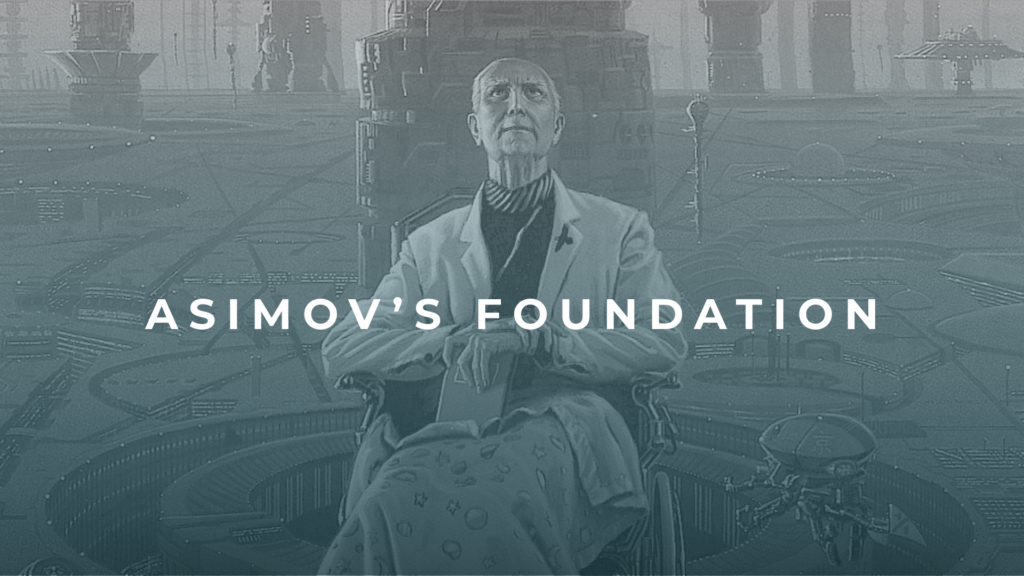
In Asimov’s renowned Foundation trilogy, the Galactic Empire is crumbling. Civil war and nuclear holocaust are imminent. An inevitable dark age of 30,000 years awaits humanity.
All of humanity’s knowledge will be lost.
Hari Seldon, leader of a fringe scientific movement called Psychohistory, becomes aware of this impending doom and devises a plan. Mankind will establish a colony on the edge of the galaxy – a Foundation – and catalog all of humanity’s knowledge in an Encyclopedia Galactica. This will reduce the dark age to only 1000 years and allow humanity to rebuild.
Today, we live at the intersection of three major societal shifts.
- The global economy abandoned a gold standard in 1971, which has since caused the destruction of our middle class and plunged us all into drowning debt and inescapable inflation. The solution from our elected (and appointed) leaders? Print more money!
- We are in the midst of a “Great Reset.” The US dollar (cough, petrodollar) is on the decline and competing powers are vying to replace it. China, specifically, aims to displace the United States as the dominant global superpower by 2049. The CCP is already exporting its tried-and-tested, authoritarian, mass surveillance system to the rest of the world.
- With the invention and global adoption of the Internet, our world is entering its Fourth Stage as an Informational society. As noted in The Sovereign Individual, an eerily prescient publication, this societal shift will force the Nation State into decline.
While our world is not at risk of 30,000 years of darkness (we hope), we are experiencing hard times – and they will only continue to grow harder throughout this decade.
One potential outcome is that China becomes the new global superpower and succeeds at exporting its authoritarianism to us all. The CCP uses its digital yuan as a tool of population control and mass surveillance, creating a permanent ruling class of elites that control how money is printed and distributed. Society experiences a twisted combination of 1984 and Fahrenheit 451.
Bitcoin offers us salvation. Rather than transitioning to yet another centralized currency, fabricated by a central bank, backed by nothing – Bitcoin reaches mass adoption as the decentralized global reserve currency. We experience a separation of money and state. Permanent inflation ends. Individuals can save and invest in their future. Governments’ ability to wage endless wars, via money printing and taxation, is no more. A new peaceful, prosperous era of the sovereign individual emerges.
Bitcoin is our Foundation. Mass embrace of Bitcoin will enable humanity to minimize the duration of chaos and emerge in utopia.
A transition to a Bitcoin Standard will not be easy. In this decade we will face seemingly insurmountable resistance from a dying fiat system that is gasping for breath as it drowns. Much of this resistance will be political – governments will attempt to ban, curtail, and cripple Bitcoin as its user base grows. But Bitcoin, and its forces of decentralization, will also threaten the incumbent technology gatekeepers that control how the world accesses the Internet.
The vast majority of the world’s population accesses the Internet via devices and services made by Apple and Google. The vast majority of the world’s population uses closed source devices made by small numbers of large manufacturers. So if we want to opt out of the Fiat Standard, and opt into a Bitcoin Standard, how can we do so as the incumbents resist?
The answer is simple. We must rebuild and catalog humanity’s knowledge, just like Hari Seldon did in Asimov’s Foundation. But unlike Seldon, we don’t need to build our Encyclopedia on a remote planet on the edge of the galaxy. Instead, we can build it in the open – through the power of Free and Open Source hardware and software.
This is why we started Foundation Devices – to accelerate the adoption of Bitcoin by rebuilding and cataloging humanity’s knowledge as open source. To create a permissionless hardware and software foundation on which others can build. To help guide humanity through our transition to the Fourth Stage.